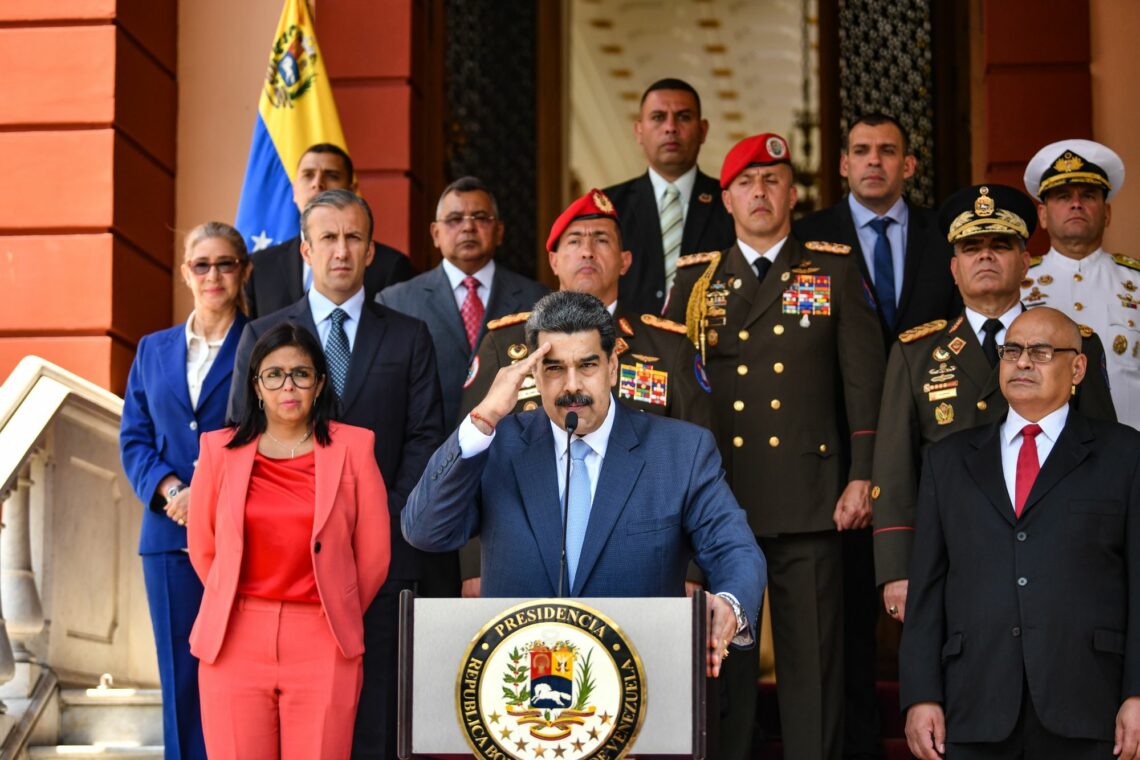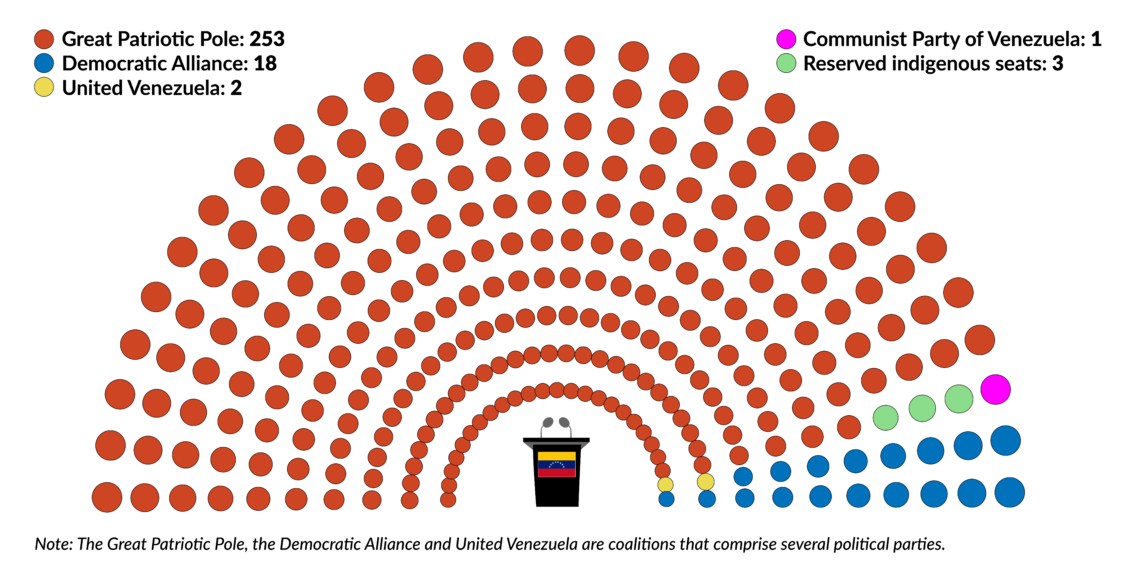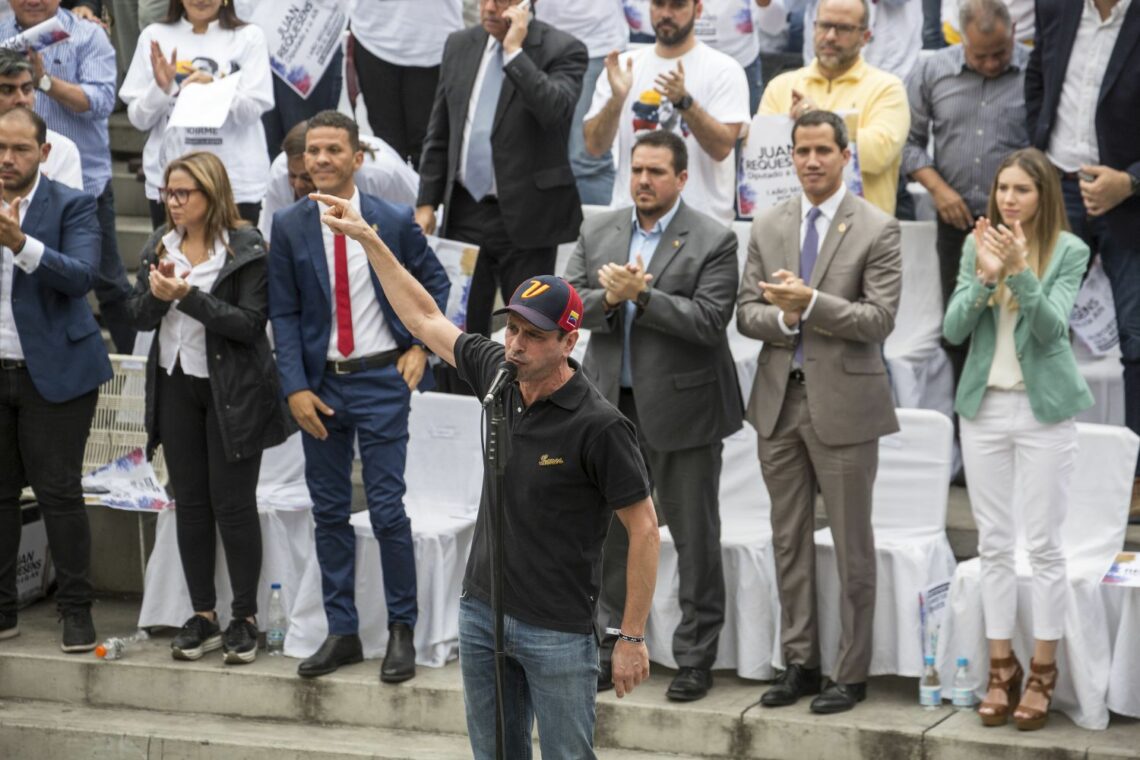The pandemic helps Maduro dig in deeper
The regime of Nicolas Maduro is more entrenched than ever. While the opposition in Venezuela remains fragmented, the government has used the pandemic to strengthen its grip on power. Now, the strongman president is ready to use vaccines as a political cudgel.

In a nutshell
- Recent elections solidified Nicolas Maduro’s power
- Venezuela's opposition remains divided and weak
- Vaccine distribution will be used for political gain
Despite facing widespread domestic opposition and significant economic difficulties, the dictatorship of Nicolas Maduro is more deeply entrenched than ever. The government controls all state institutions – including the National Assembly – for the first time since 2015, and has used the Covid-19 pandemic to impose strict limits on society.
Meanwhile, the fragmented opposition cannot agree on a common goal, let alone a strategy. Economically, the United States seems intent on retaining its sanctions on Venezuela, while Caracas is equally committed to finding creative ways around them. All of this suggests that Mr. Maduro will remain in power for years to come.
National Assembly
December’s National Assembly elections, which were neither free nor fair, tilted the political balance of power even further toward the government. Led by Juan Guaido, most opposition parties boycotted the vote in protest of the electoral conditions, meaning the result was never in doubt. The Great Patriotic Pole (GPP) alliance, including the ruling United Socialist Party of Venezuela (PSUV), won some 69 percent of the vote and an overwhelming 253 of 277 total seats. On top of the restrictive electoral conditions, official turnout was a meager 30.5 percent, further detracting from the new assembly’s legitimacy. The European Union, the U.S. and the Organization of American States were quick to reject the vote’s validity.
President Maduro holds power over all elected and nonelected state institutions.
Nonetheless, the governing regime appears as strong as ever, with Mr. Maduro holding power over all elected and nonelected state institutions. On January 5, after seating the National Assembly, the president officially disbanded the Constituent National Assembly (ANC), which was elected in 2017. This pro-government body had ostensibly been formed to draft a new constitution, but in practice usurped the functions of the opposition-controlled National Assembly. Still, given the de facto legislative power Mr. Maduro already enjoyed, it is hard to see how this significantly increases his lawmaking abilities.
By contrast, the elections weakened the opposition coalition. Confronted with the choice of collectively participating or collectively abstaining in a flawed electoral process, coalition members instead opted to act individually. While most parties abstained, some placed candidates, winning 19 percent of the vote. These divergent behaviors reflect the deep splits within the opposition regarding coalition leadership, strategy, government engagement and short-term goals, and mark a departure from the unified front these factions presented throughout 2019 and the beginning of 2020.
Facts & figures

In practical terms, one immediate result of the election is that Mr. Guaido lost his formal title as President of the National Assembly – a title that had formed the basis of his claim to the interim presidency. This, in turn, was crucial to his efforts to secure international support for his position as the opposition leader. On January 25, the Council of the European Union confirmed that it no longer recognizes him as Venezuela’s interim president.
Free-market turn
Economically, the socialist government appears to have pivoted toward the free market, at least partially in response to U.S. economic sanctions. In October 2020, the ANC approved “anti-blockade” legislation that opens doors to the private sector by providing Mr. Maduro with “legal tools to counteract, mitigate, and reduce” the impact of international economic sanctions.
Among other noteworthy provisions, the law allows the president to “modify the mechanisms of constitution, ownership, management, administration, and operation of public or mixed-ownership companies,” and to “authorize and implement measures that stimulate and favor the participation, management … and operation of the national and international private sector in the development of the national economy.” This could pave the way for, among other things, the liberalization of the oil industry.
Facts & figures
Dollarization
Dollarization is when a country uses the U.S. dollar in addition to or instead of its own domestic currency. A government will usually turn to dollarization when the domestic currency loses its usefulness as a medium of exchange because of hyperinflation or instability.
The government has also begun to loosen restrictions on foreign currencies to boost the country’s struggling economy, furthering de facto dollarization. Venezuelan banks have stored cash dollars for corporate clients since at least early 2020, and some recently started issuing debit cards to clients who have accounts in hard currency. Despite public protestations, the authorities likely wish to extend the use of dollars in routine transactions.
Covid’s impact
While Covid-19 continues to stress the country’s economy and collapsing health system, the government has used the pandemic to exercise further control over its population. Among other things, it has directed the military to enforce a nationwide curfew and social distancing measures, increased harassment of journalists who have tried to cover the government response to the pandemic and even detained members of a nongovernmental organization focused on healthcare and HIV/AIDS. In addition, Mr. Maduro has maintained strict controls on economic activity to contain the spread of the virus – although, as with infection numbers, the government has limited the information available on the economic impact of the lockdown.
The regime has failed to obtain vaccines from allies such as Russia and China.
A significant portion of the political battle in 2021 will revolve around healthcare and vaccine access. In late 2020, Mr. Guaido’s team distributed $11 million to help Venezuela’s medical workers, and it is now trying to help the country pay for coronavirus vaccines. Nonetheless, the international community, including the United Nations, is restricting Venezuela’s access to vaccines because Mr. Maduro has manipulated testing and supplies.
The regime has so far failed to obtain vaccines even from allies such as Russia and China. Mr. Guaido’s team agrees with the international community’s strategy, saying that President Maduro should not be trusted with the vaccine because he will not distribute it fairly.
Yet, Venezuela needs vaccines as urgently as any other country. Opposition politician and former presidential candidate Henrique Capriles is pushing for negotiations with the government focused on improving vaccine access. However, in so doing, he may also be making a play to supplant Mr. Guaido as head of the domestic opposition.
Biden’s policies
The change in leadership of the U.S. will also affect Venezuela’s outlook for this year. Aside from granting Temporary Protected Status (TPS) to the more than 300,000 Venezuelans living in the U.S., President Joe Biden’s administration has mostly tried to show continuity with many aspects of his predecessor’s strategy. This includes recognition of Mr. Guaido as interim president as well as maintenance of the economic sanctions framework. And while the Biden administration seeks to rely more heavily on a multilateral global approach than former President Donald Trump, there is no sign the new team has any intention of reversing Mr. Trump’s stance.
The Biden administration is still filled with analysts and policymakers who want to pressure Mr. Maduro from office. They also believe the U.S. should use tools like sanctions to punish individuals credibly accused of human rights abuses and corruption.

Yet, the tone and likely range of policies have undoubtedly changed. Whereas the Trump team often valued symbolic rhetoric and actions, the Biden team seems more likely to consider the longer-term consequences of sanctions policy. There also appears to be more space for moderate views and options that would have been considered unrealistic under the previous administration.
Mr. Maduro would welcome a dialogue with Washington that could lead to reducing the economic pressure on his regime. Nonetheless, any relief would be limited and done with humanitarian purposes in mind.
Scenarios
One likely political scenario for Venezuela in 2021 is no change in the status quo: Mr. Maduro remains in power while Mr. Guaido muddles along as an increasingly unpopular opposition leader, and neither side cedes any power to the other. The opposition split means that some parties participate in the upcoming municipal elections despite a lack of guarantees for electoral integrity, allowing the government to falsely claim legitimacy.
As a result, the U.S. refuses to loosen sanctions, compelling the Venezuelan government to continue its elaborate evasion policies. This is probably the worst outcome for Venezuelans since it is the scenario where economic prospects are the dimmest, and the fewest Covid-19 vaccines enter the country.
A second, slightly more optimistic scenario would see the government and moderate sectors of the opposition engage in piecemeal negotiations that lead to limited humanitarian relief and partial guarantees for participation in municipal elections in exchange for some reduction in sanctions from Washington. One such guarantee would be a more politically diverse National Electoral Council, which some nongovernmental organizations and opposition members, including Mr. Guaido, are already attempting to secure.
If this happens, Mr. Maduro will remain in power. While most sanctions, especially individually targeted ones, remain in place, some relief allows for moderate economic gains compared to 2020. This is a far better outcome for hungry and needy citizens and would provide more (though probably still inadequate) vaccination coverage for the population.
Despite rhetoric from Mr. Guaido and others, the least likely outcome in 2021 is Mr. Maduro’s removal from power or a sudden re-democratization of the country. The government survived serious attempts to unseat it in 2019 and some less serious ones in 2020. A fractured opposition without widespread popular support or military backing is unlikely to have greater success in 2021.
Regardless of what happens in the political realm, the government will continue to pursue economic liberalization and dollarization. The bulk of daily transactions carried out in Venezuela are now made using U.S. dollars, meaning that poorer Venezuelans without access to them face even more of a struggle to purchase basic goods. So publicly, Mr. Maduro and others will continue to defend the official use of the bolivar soberano as currency, while moving toward the U.S. dollar.
Similarly, in any scenario, governing Chavista leaders will also use healthcare, and especially whatever vaccines they can get their hands on, as a weapon against their perceived enemies and the political opposition. The government has already weaponized food in this fashion; it will similarly wield the vaccine – for instance, by demanding political fealty from vaccinated neighborhoods.
It is also likely that infrastructure failures and corruption will hinder vaccine delivery. Distributing refrigerated vaccines is an enormous task in a country where gasoline supplies are limited and electricity regularly fails. In even the best-case scenario, it is fair to expect that the bulk of vaccines will go to regime loyalists, many will go to waste, and those that make it to the needy and vulnerable do so in highly public ways.








